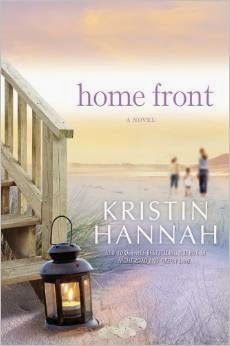I am thrilled today to turn my blog over to author Julie Musil, who offers Writing Lessons Learned from her latest read. I'm a big fan of Julie and I love her lessons. I hope you will, too.
Writing Lessons Learned from HOME FRONT
One of my favorite
unintentional things to do while reading a great book is to take away writing
lessons. I love jotting down helpful techniques used by some of my favorite
authors, such as Kristin Hannah.
Here’s a brief blurb
of Kristin Hannah’s novel, Home Front, which I recently finished.
Like many
couples, Michael and Jolene Zarkades have to face the pressures of everyday
life--children, careers, bills, chores--even as their twelve-year marriage is
falling apart. Then an unexpected deployment sends Jolene deep into harm’s way
and leaves defense attorney Michael at home, unaccustomed to being a single
parent to their two girls. As a mother, it agonizes Jolene to leave her family,
but as a soldier she has always understood the true meaning of duty. In her
letters home, she paints a rose-colored version of her life on the front lines,
shielding her family from the truth. But war will change Jolene in ways that
none of them could’ve foreseen. When tragedy strikes, Michael must face his
darkest fear and fight a battle of his own--for everything that matters to his
family.
Here are some writing
lessons I learned from this gut-wrenching book (Alert! If you plan to read this
book, and don’t want to know any plot points, read no further!):
•
Role
Reversal--the main
character, Jolene, is a female helicopter pilot in the reserves who is sent off
to war. I normally think of men in this position, which is just me
stereotyping. The female warrior angle was really cool. The end of the book
included an interview with a real female helicopter pilot, which was
intriguing.
•
Unhappy
Goodbye--leaving for war
must be bad enough. But leaving for war while your marriage is crumbling?
Saying goodbye to a tween daughter with attitude? These sad puzzle pieces made
Jolene’s goodbye even harder. How can you repair a marriage and guide a young
daughter when you’re thousands of miles away?
•
Natural
Conflict--Jolene is Army
Strong and believes in her mission. Her hubby is a talented lawyer with strong
beliefs of his own, and doesn’t support her mission. This natural conflict
added layers to the plot. If the husband had been supportive, a heap of
conflict would’ve been missing.
•
Character
Flip Flop--at the beginning
of the story, Jolene is a can-do, turn-that-frown-upside-down kind of person. After
a tragic injury, she changes completely. The internal dialog is what carries
this massive change. The survivor’s guilt, the frustration, and the depression
all add to this believable character shift. There are some things in life you
just can’t fake your way through.
•
Make
Matters Worse--just when the
situation was bad for the main character, the author made things worse. Going
off to war is bad enough, but then add a fractured marriage. A fractured
marriage is bad enough, but then add traumatic injuries. Injuries are bad
enough, but then add deaths of friends. Kristin Hannah is brilliant at piling
it on her poor characters.
What do you
think of these writing lessons? Have you used any yourself? Have your read Home
Front, or any other Kristin Hannah novels? Any new writing lessons you’ve
learned lately? Please share!
Julie
Musil writes from her rural home in Southern California, where she lives with
her husband and three sons. She’s an obsessive reader who loves stories that
grab the heart and won’t let go. Her YA novels The Summer of Crossing Lines and The Boy Who Loved Fire are available now. For more information, or to stop by and say Hi, visit Julie on her blog, on twitter, and on Facebook.




I took a mantra away from one of the writing classes I took: "How can I make it worse?" Kristin Hannah appears to have that down to an art form. Well written, Julie. Still loving your masthead picture, Marcy!
ReplyDeleteMarcy, thanks so much for having me here today!
ReplyDeleteLiza, I tell ya, Kristin Hannah is soooo good at this. And "How can I make it worse?" is something I need to remember!
That's a great lesson to keep in mind--keep making things worse for your characters. Congrats to Julie on her new book!
ReplyDeleteSmart to flip the roles. After all, there are a lot of women pilots in our military.
ReplyDeleteBad marriage, going to war, tragedy and guilt - now that is piling it on.
Excellent points and observations, Julie!
Natalie and Alex, thanks! While reading this book I thought, dang, I feel so bad for this woman!
ReplyDeleteI don't read romance anymore really, but this one sounds like it has really strong characters. Throwing those obstacles in the way is the heart of good fiction--as tough as it is for the author to do!
ReplyDeleteStephanie, I rarely read simple romances anymore either. I like it when romance is the sub plot!
ReplyDeleteUnhappy goodbye - real life is a lot more complicated than most fiction would have you believe. I admire fiction writers who can make good use of those complexities.
ReplyDeleteYikes. Yeah, the writer should throw on the obstacles, but at a certain point it gets hard to read.
ReplyDeleteArmchair, you're right, and this was a great example of the author not making the goodbye too perfect. I couldn't imagine going off to war at all, let alone after an unhappy departure.
ReplyDeleteLiz, I have a love/hate with this type of emotional book. It wrecks me inside, and yet I love it.
Thanks for stopping by!